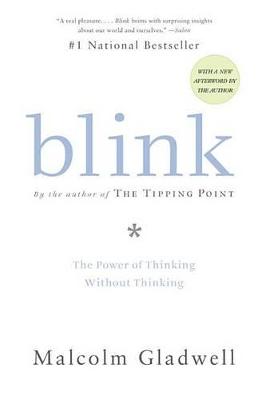
The landmark book that has revolutionized the way we understand leadership and decision making -- from #1 bestselling author Malcolm Gladwell.In his breakthrough bestseller The Tipping Point, Malcolm Gladwell redefined how we understand the world around us. Now, in Blink, he revolutionizes the way we understand the world within.
Blink is a book about how we think without thinking, about choices that seem to be made in an instant--in the blink of an eye--that actually aren't as simple as they seem. Why are some people brilliant decision makers, while others are consistently inept? Why do some people follow their instincts and win, while others end up stumbling into error? How do our brains really work--in the office, in the classroom, in the kitchen, and in the bedroom? And why are the best decisions often those that are impossible to explain to others?
In Blink we meet the psychologist who has learned to predict whether a marriage will last, based on a few minutes of observing a couple; the tennis coach who knows when a player will double-fault before the racket even makes contact with the ball; the antiquities experts who recognize a fake at a glance. Here, too, are great failures of "blink": the election of Warren Harding; "New Coke"; and the shooting of Amadou Diallo by police.
Blink reveals that great decision makers aren't those who process the most information or spend the most time deliberating, but those who have perfected the art of "thin-slicing"--filtering the very few factors that matter from an overwhelming number of variables.
- ISBN10 0316010669
- ISBN13 9780316010665
- Publish Date 3 April 2007 (first published 1 January 2005)
- Publish Status Active
- Publish Country US
- Publisher Little, Brown & Company
- Imprint Back Bay Books
- Format Paperback
- Pages 320
- Language English
Reviews


pamela
Not my favourite Gladwell book. While it had some interesting information, I found a lot of it rather anecdotal and contradictory. It's basically instinct vs logic, which isn't exactly a revolutionary idea.
I listened to the audiobook, and it's clear how much Gladwell's podcasting has helped improve his audiobooks over time. His newer audiobooks are much more engaging and take advantage of his unique narrative style. Because of this, I found this older one a little dry to listen to, and my mind wondered. It reminded me why I've spent so long being put off by the format
This wasn't a bad book, it was just OK.

jamiereadthis
(Which is a pretty funny analogy: I don’t like popcorn. But I like the idea of it!)

ladygrey

remo
De nuevo, un libro de Malcom Gladwell [MG]. MG ha escrito un ensayo sobre cómo nuestro pensamiento subconsciente (lo que se suele llamar “la primera impresión”) es muchas veces más certero que nuetro pensamiento lógico cuando nos enfrentamos a un problema nuevo. A lo largo de libro nos habla de muchas historias en las que los protagonistas supieron desde el principio cuál era la solución a un problema (descubrir si una estatua era falsa, ver si una pareja aguantará junta cinco años…), aunque costara mucho tiempo llegar a fundamentar racionalmente tal decisión.
El libro, estimados lectores, tiene sus pros y sus contras. Su principal atractivo para mí es que todas las historias que cuenta son extremadamente interesantes. Me encantan. Son realmente entretenidas y el estilo del autor es fluido y didáctico. El punto en contra es que todas las historias juntas no consiguen convencerte de la tesis del autor. La segunda mitad del libro, de hecho, habla de cómo nuestro subconsciente puede verse engañado por esa “primera impresión”, echando por tierra todo lo que nos había contado en la primera parte. Curioso. En The tipping point sucedía algo parecido. Las historias son todas interesantísimas, pero uno no acaba convencido de lo que quiere demostrar el autor. La impresión que da es que ha juntado muchas historias para intentar imbricarlas en un todo, sin conseguirlo. Cada historia tiene su moraleja, pero no siempre es la moraleja que el autor quiere darle.
Hay además un fallo de bulto: en una de las secciones, el autor intenta demostrar que si uno es más alto tiene mayores probabilidades de ser director de una empresa (CEO). Como prueba, mira las estaturas de los directores de las principales empresas norteamericanas y comprueba que son superiores a la media. Cae de lleno en la falacia post hoc, ergo propter hoc (después de, por tanto a causa de). El hecho de que una cosa suceda a continuación de otra NO implica que está causada por ella. Pueden estar ambas causadas por una tercera cosa o pueden ser independientes. Clamoroso fallo en un libro por lo demás medianamente bien argumentado.
En cualquier caso, les recomiendo el libro. No lo miren como un ensayo razonado sino como una colección de historias interesantes. En eso sí que es un libro superior.
Mi nota: Muy entretenido
